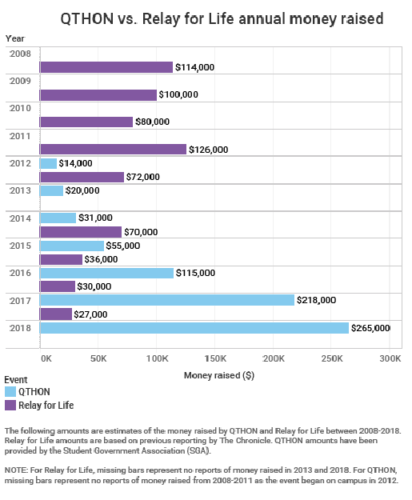[media-credit name=”Kayley Fasoli | The Quinnipiac Chronicle ” align=”aligncenter” width=”500″] [/media-credit]In recent years, Quinnipiac University’s annual Relay for Life event has seen a drop in participants and overall money raised. The walk was held on the Quad, Saturday Sept. 29.
[/media-credit]In recent years, Quinnipiac University’s annual Relay for Life event has seen a drop in participants and overall money raised. The walk was held on the Quad, Saturday Sept. 29.
The eight-hour-long walk-a-thon sponsored by the American Cancer Society, brought together students and members of the surrounding community raising over $30,000 for cancer research.
Teams were formed from students in groups like the Honors Program and Greek Life.
Liana DiMitri, freshman film, television and media major heard about the event through the Honors Program. She signed up the day of and attended because it was a required activity for the program.
“This was my first relay event,” DiMitri said. “I don’t know anyone affected by cancer, but I enjoyed walking with others who had been survivors of cancer and supporters of people with cancer.”
ATTENDANCE
Event attendance has dropped from over 1,000 participants 2008 to 2012, to just over 250 this year, according to past Chronicle coverage.
“I do believe years ago the attendance was much higher; however, I do see improvement in the attendance each year since I have started my years at Quinnipiac,” head co-chair junior nursing major Morgan Mattil said.
In an informal survey conducted by The Chronicle with 36 participants:
•19 said they did not attended Relay.
•7 said they didn’t know it was happening.
•9 said they attended.
•11 said they’ve attended Relay in the past at Quinnipiac.
•12 said they’ve attended outside of Quinnipiac.
•13 said they’ve never attended a Relay in the past.
In the survey, students responded to the question: “Why do you think the attendance of Relay has decreased from past years?” Participants had the choice of answering anonymously or leaving a name. Those who left a name responded:
“The university doesn’t promote [Relay] as much or as well as they promote other service events like Big Event or QTHON,” junior political science major Ashlee Baldwin said. “If the university did more to help promote it, and if the committee partnered with Greek Life and other orgs., they would probably get better attendance.”
In the spring, QTHON was sponsored by all but two Greek Organizations on campus.
“At other places Relay happens at night going along with how “cancer never sleeps.” There also needs to be more advertising for the event, like when and where it is,” sophomore biomedical science major Olivia Powers said. “If more outside people came I think it would attracted more students, because students would see the whirl of emotions from the survivors and caregivers and it would touch more people.”
Anonymous responses included comments such as:
•Too early in the year.
•Not advertised enough.
•QTHON shouldn’t be allowed to start fundraising until after Relay.
•Interferes with Quinnipiac’s Saturday night nightlife.
•Sunday afternoons could increase attendance.
•Not emphasized in Greek Life.
•Wasn’t an engaging environment.
MONEY RAISED
The amount of money raised through Relay over past years has decreased from the initial $100,000 raised after the first year of the event in 2008.
“Honestly, I wish there had been more tabling and involvement from other student organizations, but a lot of plans fell through the week before the event date,” Mattil said. “It happens. Overall, I think the event went really well and we had a great turn out.”
The organization will continue fundraising until the end of the 2018 year. Mattil said they do receive more money after the event date.
[media-credit name=”Graphic by Christina Popik” align=”aligncenter” width=”412″] [/media-credit]
[/media-credit]
ABOUT QTHON
In a 2017 Chronicle article on Relay for Life, Liz Monroe, co-chair of Relay for Life at the time, said they aimed to be as huge as QTHON is. QTHON is an event on campus that raises money for the local Children’s Miracle Network Hospital. Like Relay, QTHON, is a community wide event hosted by schools across the United States.
The Chronicle reported in a 2014 article that Quinnipiac’s first QTHON was February 2012. QTHON started as a Delta Tau Delta philanthropy event, according to the article and as of 2015, became its own Student Government Association (SGA) chartered organization on campus.
In 2016, QTHON had a 110.3 percent growth of funds raised from the previous year, according to data provided by QTHON.







